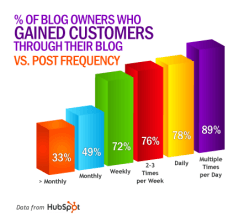4 Upshots Of Content Marketing’s Explosive Growth
Content marketing is moving at light speed and expected to be worth $412 billion by 2021, according to market study by Technavio. Companies of all sizes are reallocating their digital ad dollars to content marketing because it’s one of the most economical and effective ways to build authentic relationships with their customers.
As with any booming industry, though, it’s prime for disruption and it will be a much different animal in two years than it is today. AI will overtake content generation, brand safety concerns will heighten, new platforms such as Amazon’s Echo will be part of the mix and in-house content studios will impede some agencies.
Companies prepared to adapt to these changes that are already underfoot will be the standouts as content marketing hits its inflection point.
1. AI reduces prices…and quality –Gartner estimates 20% of all business content will be machine-generated in 2018, as robo-journalists continue to get better at authoring content that is hard to discern from human writing. Automated content generation will make content marketing less laborious and expensive – and even aid with personalization – but there will be a quality trade-off. The biggest risks come with removing the human element and the creativity it brings, which is what makes good content marketing so effective. Companies will need to spend real money to get the content they need to drive a successful program, and not sacrifice quality in their quest for quantity.
2. Brand safety becomes a bigger concern – Unlike with advertising, brand safety hasn’t been a widespread issue with content marketing because companies can more easily ensure their content doesn’t appear next to something risqué or inappropriate. That’s poised to change as companies pour more budget into their content marketing initiatives and strive to get their content seen in as many places as possible. Content running on 100 websites is exceedingly more difficult to police than content running on a small handful, and there is a much stronger likelihood of it appearing aside something with an extremist or offensive tone.
3. Voice assistants change the game – Americans are plugging into voice-powered smart speakers such as the Amazon Echo, and Juniper Research predicts 55% of households will have one by 2022. They’re not only going to change voice search marketing, but also content marketing, and companies need to be incorporating them into their strategies now to maximize the opportunity they present. This applies to B2B brands as well because these voice assistants are already finding their way into offices. Content marketers will need to quickly learn how to optimize their content for these devices, and to formulate new metrics to measure audio in both B2C and B2B environments.
4. Brands bypass agencies, publishers and build their own content studios – In the past few years, legacy publishers such as Atlantic Media, The New York Times and Time Inc. have spun off agency-style units that create branded content for clients that mimics editorial. To engage in compelling new ways with their ad-blind customers, major brand marketers turned to them, as well as to their ad firms, to compose everything from native articles to explainer videos to social posts. However, the tide is turning, and more brands are setting up their own in-house studios, poaching journalists and creative directors to gain more control over their programs and ensure they align with their brand story. This shift could spell trouble for publishers and ad agencies that will feel the impact in terms of lost clients and talent.
Content marketing’s popularity will continue to soar and, with its growth, will come more work and challenges. The marketers who can anticipate and forecast the trends will be most equipped to shape the future of their programs.
(73)









